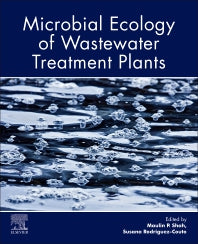Freshly Printed - allow 10 days lead
Couldn't load pickup availability
Microbial Ecology of Wastewater Treatment Plants
Highlights the importance of understanding microbial communities and their interactions in WWTPs for their successful exploitation
Maulin P Shah (Edited by), Susana Rodriguez-Couto (Edited by)
9780128225035, Elsevier Science
Paperback, published 18 May 2021
570 pages
23.4 x 19 x 3.5 cm, 1.16 kg
Microbial Ecology of Wastewater Treatment Plants presents different methods and techniques used in microbial ecology to study the interactions and evolution of microbial populations in WWTPs, particularly the new molecular tools developed in the last decades. These molecular biology-based methods (e.g. studies of DNA, RNA and proteins) provide a high resolution of information compared to traditional ways of studying microbial wastewater populations, such as microscopic examination and culture-based methods. In addition, this book addresses the ability of microorganisms to degrade environmental pollutants.
1. Structure and function of microbial communities2. Microbial community genetics, transcriptomics, proteomics and metabolomics3. Microbial interaction4. Microbial communication5. Microbial ecology6. Microbial population biology7. Biogeochemical processes (C, N, P, S-cycles)8. Microbial life in extreme environments9. Evolutionary processes of microbial communities10. Biofilm formation and surface microbes11. Metabolic flux analysis and stable isotope probing (DNA, RNA and protein)12. Microbiome biology of environmental habitats13. Microbial treatment14. Microbial pollution: pathogenic microorganisms in the environment (water/soil/air/food)
microbial metabolism and environmental pollution (e.g., microbial toxin)15. Microbiological monitoring: testing methods and monitoring techniques development16. Microbial Degradation of Xenobiotics17. Microbiological Wastewater Treatment18. Genetics and Physiology of Anaerobic Hydrocarbon-Degrading Microorganisms19. Bioremediation - The Natural Solution20. Molecular Ecology and Genetic Diversity of Marine Microorganisms
Subject Areas: Biochemical engineering [TC]


